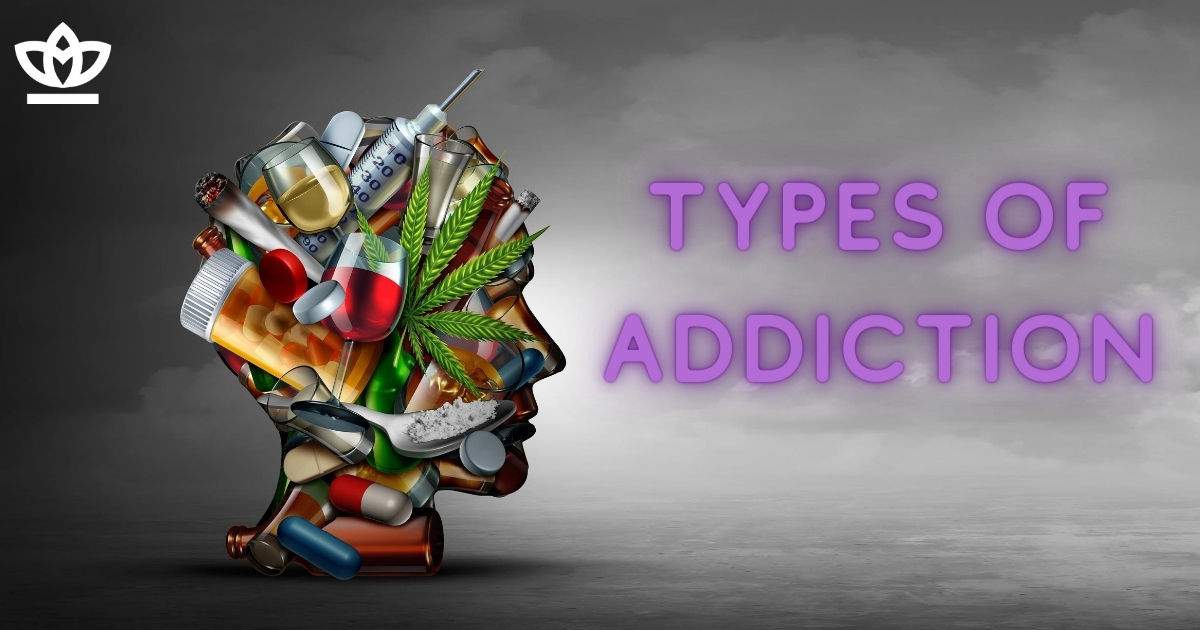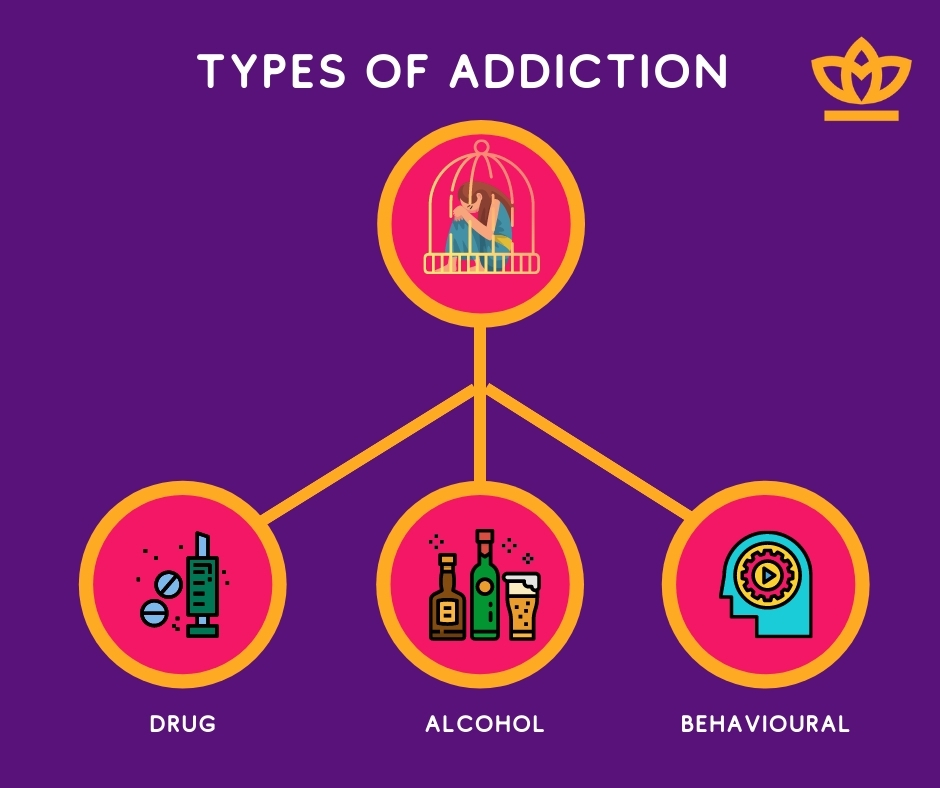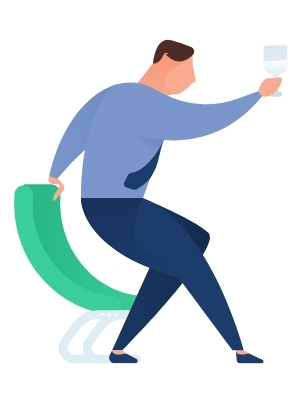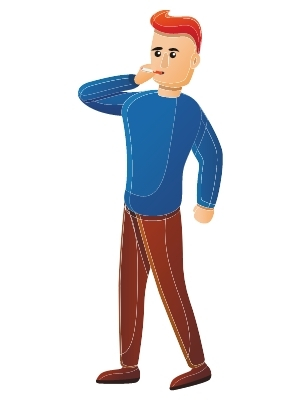Types of Addiction – A Comprehensive Guide

The following blog has been reviewed by an expert. For more information, please see our editorial policy.
Many people think that addiction is some form of personal weakness, which continues only because of unwillingness or lack of willpower. However, the idea that pleasure-seeking primarily induces addiction has dropped by the wayside within scientific communities.
Medical experts and scientists have drawn a common conclusion that most people engage in various types of addictions for a psychoactive experience to make themselves feel better or keep worries at bay, even if it is momentary.
The nucleus of addiction resides in behaviours linked to the quest for pleasure and self-medication. Consuming alcohol or drugs provides people with a sense of satisfaction. Sometimes, the feelings get so strong that the relief becomes a craving. If a person drinks alcohol regularly for pleasure, over time the body develops its “need” for functioning properly, which can further lead to more negative effects while weakening pleasure.
Different types of addictions have a different effect on people depending upon their usage. Some may suffer from mild impairment of cognitive functionalities, while others may have a severe impact. There are some types of addictions which are not categorized by any substance use as particular behaviours define them.
Types of Addiction Explained

Let’s look at various forms of addictions that have impacted many people’s lives:
- Types of Addiction- Alcohol Use
- Types of Addiction- Drug Use
and similar other unauthorized substances
- Types of Addiction – Behavioural or “Process”
- Food
- Video games
- Exercise
- Spiritual obsession
- Shopping
- Gambling
- Mobile Phone
- Pornography
- Sexual Intercourse
- Relationships
Alcohol Addiction

In modern days, drinking alcohol has become a fashion statement which is considered as a harmless activity, especially while attending events. In reality, any amount of alcohol consumption for regular use can have mild to severe consequences. Some mild effects include unmanageability of tasks and being irresponsible towards duties.
Some severe effects of heavy alcohol consumption can lead to withdrawal symptoms, increased stress and lifestyle disfunction.
Where many people turn towards alcohol to relieve their stress or cope with feelings, it can lead to dependency and further substance abuse, thereby, deteriorating health.
A person who gets involved in drinking more than four drinks per sitting may develop a habit of binge drinking, which can have serious long-term health effects.
Drug Addiction

There are many drugs, illicit or prescribed, taken by people who seek to get high and have an altered view of reality to feel better, happy and relaxed. Those who consume drugs of various forms which may cause short-term brain disruptions and lead to damage to their vital organs. Overtime, consistent or heavy drug use can lead to unintended long-term changes in the brain.
Some common types of addictions are explained below.
Stimulants
Stimulants are one of the frequently used types of addictions which speeds up the psychological and physical functions of a human body. People who abuse stimulants appear to experience a substantial boost in their energy levels with a strong sense of superiority. Under a doctor’s care, some stimulants can be effective for treating mental health issues, like ADHD. but other stimulants offer less or no psychiatric benefits. Common stimulants used by individuals are Cocaine, Adderall, and Meth.
Opioids
2.1% of the total population of India uses opioids, which includes natural substances like heroin, synthetics like fentanyl, and other varieties of pharmaceutical opioids. Many times, its regular consumption results in vital organ damage or failure, overdose or respiratory problems. Some injectable opioids can also lead to collapsed veins and an amplified risk of catching diseases borne by blood.
A survey by the Government suggests that of 8.5 lakh people who inject opioids, 46% of people use Heroin. In India, 2.6% of the current population use opioids, including opium, making it one of the largest abused drugs alongside alcohol and cannabis.
Hallucinogens
Once consumed, hallucinogens are known to enhance one’s experience for a considerable time, which has also been the main reason behind its popularity in the club culture. Although there are several risks associated with hallucinogens, the prime area of concern is that anyone under its influence may act in a certain way which is potentially harmful or lethal, sometimes. Some of the common hallucinogens are LSD and ketamine. MDMA (or ecstasy) has both hallucinogenic and stimulant effects.
Inhalants
77 Lakh people between 10 to 75 years use inhalants. These are toxic compounds that can easily be inhaled to create chemical vapors to cause a psychotropic effect. Although it is a lesser abused drug than the others, its consequences can not be overlooked. Many studies have shown that people using inhalants, like solvent drugs and poppers, develop dependence over time, just like others.
Behavioural or Process Addictions

Most of the daily behaviours and activities you engage in reflect your interests, goals, and expectations for overall development and progress. For such passionate behaviours, discretion and patience are crucial.
Behavioural addictions, sometimes called process addictions, come into play when a person continues to engage in such activities compulsively despite losing control, sense of fulfilment, and pleasure. Such behavioural addictions are often accompanied by guilt, adverse effects on social and mental health, and disrupting financial life.
Most of the daily behaviours and activities you engage in reflect your interests, goals, and expectations for overall development and progress. For such passionate behaviours, discretion and patience are crucial.
Behavioural addictions, sometimes called process addictions, come into play when a person continues to engage in such activities compulsively despite losing control, sense of fulfilment, and pleasure. Such behavioural addictions are often accompanied by guilt, adverse effects on social and mental health, and disrupting financial life.
Some of the signs include compulsive engagement in a particular activity, difficulty in relationships at home and work, and struggling psychological and physical health.
Some common types of behavioural addictions are
Eating
The unrealistic representations of human body shape by media and culture has led many people to engage in various dysfunctional eating habits, leading to a rise in eating disorders. It includes bulimia nervosa, compulsive eating, and binge-eating disorder. Most of the time eating disorders lead to obesity; in some cases, it is also developed in an average-weight person. An underweight person can also become addicted to binge eating. To compensate for binge eating, an underweight person can adapt regular fasting for weight loss, as a result, begins to look like an anorexic or unhealthily thin.
Gambling
Gambling is one of the recently increasing types of addictions where people are addicted to gambling of various sports or games, threatening their career, family or life. Gambling behaviour is typically characterized by compulsion, placing more than one bet either simultaneously or consecutively, chasing losses by placing another bet, aggression, or being preoccupied every time.
Such gambling patterns may often lead to legal and financial issues, further leading to bankruptcy and mental health problems.
Gaming
Perhaps one of the least harmful types of addictions, gaming is where a person may engage in playing video games for an endless amount of hours without thinking of other activities. Such behaviours can also be developed to avoid real-life problems, anxiety or depression.
Compulsive video game playing may also result in broken relationships, difficulty making decisions and staying positive.
Shopping
Shopping is one of the common types of addictions often seen in women more than in men. Many studies have shown that most people who have a shopping addiction cannot control their urge to shop, even if it severely affects their financial health or damages relationships. It often starts with pleasure-seeking but ends up in the form of mental trauma.
Work
Being a workaholic is a mental health condition where a person works excessively long hours, often in efforts to be successful, find self-worth or avoid other life issues. It is one of the prevalent types of addiction among perfectionists. A workaholic tends to continue working despite facing physical, social and mental health problems.
Case Study of Indian Population
In 2019, a survey was conducted by the Ministry of Social Justice and Empowerment, Government of India and NDDTC, AIIMS, New Delhi, to know the magnitude of substance use in the country. National Surveys primary objective was to determine the degree and pattern of substance use in each state and union territory. It includes the study of the people between 10 to 75 years of age.
In this study, data from the Household Sample Survey (HHS) and Response Driven Sampling (RDS) survey was collected from people who were under the influence of drug use. The data provides detailed information on Alcohol, Opioid, Stimulants, Cannabis, Sedatives, Inhalants, and Hallucinogens.
Key Findings
- 14.6% of the Indian population (16 crores approx) is under the influence of alcohol, of which, 27.3% are men and 1.3% are women (i.e. for every 1 woman, 17 men use alcohol)
- Of 16 crore people using alcohol, 5.7 crores are problem users, while 2.9 crores are dependant users
- 2.8% of the Indian population used cannabis products within the last year
- 2.1% of the Indian population (2.3 crores approx) uses opium, heroin, and other pharmaceutical opioids, of which 1.14% of people alone use heroin
- Of 2.3 crores Indian population (between 10-75 years), 77 lakh are problem users, while 28 lakh are dependant users
- 1.08% of the country’s population is using various types of addictions such as inhalants and sedatives, both prescribed and non-prescribed
- 0.10% of people use cocaine, while 0.18% of people use stimulants and only 0.12% of people use hallucinogens
It is evident from the report that a sizable Indian population is suffering from different types of addictions who are in dire need of help for their betterment.
Getting the Right Help
Abuse of illicit, legal or prescription drugs can make brain changes, which may lead to heavy cravings. A desire for various forms of substances or behaviours may make sobriety or recovery seem like an impossible goal to achieve. Yet recovery is never out of reach, no matter how bleak the condition may seem or how many times before you have tried and failed.
Change can always be rendered with the right help.
Committing to sobriety involves you—making determined decisions about a few things:
- ways of dealing with stress
- whom to allow to stay in your life
- how to use free time
- how to think of others
- any dose of prescribed drugs you take
Here are a few things can you do, which can help you get better with time and deal with different types of addictions:
- Think positive about change
- Explore your treatment options according to various types of addictions and choose your suitable treatment option for eliminating substance dependence problems
- Find support for your recovery, be it a friend, relative, a support group or a therapist
- Discover healthy styles to cope with anxiety
- Step away from people who use drugs or force them onto you, even if they mean a lot
- Get involved in sports or similar physical activity to improve physical health and distract from thoughts of using substances
- Pick a hobby or plan your future to stay positive
- Spend some time in nature
- Share your trauma or condition with someone, preferable a therapist
- Don’t let relapse keep you down
Road to Recovery Takes Time
Addiction is a chronic condition which is often persistent. Many people also face mental health issues while facing various types of addictions. Nevertheless, people do recover from it. So, if you are facing any forms of addiction which have turned your life upside-down, do not lose hope.
The road to recovery takes time, and you only have to stick to the plan. Addiction will lose its influence as life becomes worth living. A little more effort and support, and you will reach there.
















